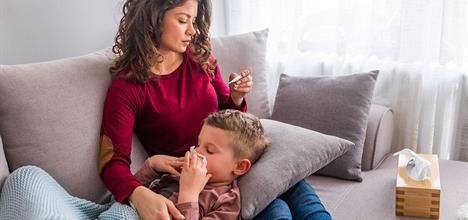
New guidance from the Centers for Disease Control and Prevention (CDC) says people who are fully vaccinated against COVID-19 no longer need to wear masks indoors or outdoors in most cases. But we realize that families with children who are not yet old enough for a vaccine may find it difficult to decide what’s best for everyone. Here are a few things to keep in mind:
For inside activities, family members who live in the same household do not need to wear masks when they are together. Schools and childcare centers may have different guidelines about mask wearing indoors, so check with officials in those places.
For outside activities, anyone who is not yet fully vaccinated, including children, should still wear masks, except:
- For activities with just members of your household, such as a bike ride or walk
- At small gatherings with fully vaccinated family and friends
- During water sports like swimming and diving or sports where masks could pose a safety risk like gymnastics, cheer stunts, tumbling and wrestling.
- In activities where individuals can keep a distance like golf and singles tennis.
- For children under 2 years old
Families should continue to engage their children in school and community activities, both indoors and outdoors. Children and adolescents who are not fully vaccinated for COVID-19 should continue to wear masks when social distancing isn’t possible.
Why masks are still important
Currently, there is no COVID vaccine for kids under age 12. Which means masks are still an important way to protect them. And since unvaccinated children can still transmit the virus to others, mask wearing protects others as well.
Parents, if you are vaccinated and your children are not, you can choose to go without a mask. But you could also choose to model mask-wearing behavior in support of your children when you are all out together. For example, everyone can wear masks for a trip to the grocery store.
If some siblings are vaccinated, younger ones who aren’t vaccinated might feel it’s unfair that they have to wear a mask. If they’re hanging out with friends together, everyone could agree to wear masks anyway.
Remember that to be fully vaccinated, you must be at least two weeks past your final dose of the vaccine. For kids ages 12 and older, that means two weeks after their second dose. Until then, they should continue to wear a mask in public places.
A family plan
There may be times when you are around groups of people who are and aren’t wearing masks. Having a family plan about masks will help your children know what to expect. Include your children in family discussions about the best way to protect everyone inside and outside your home. Ask your children and teens their opinions about mask wearing and vaccination. They have learned a lot about considering others during this time and will probably provide some pearls of wisdom to include in your family’s plan!
Normal is coming
Research shows the COVID vaccines are remarkably effective and safe and we urge all children 12 and up and adults to get the COVID-19 vaccine as soon as it is available to them. Also, clinical trials are now underway in children as young as six months old. Until everyone can be protected with the vaccine, masks can keep your family safe and healthy.
Source: American Academy of Pediatrics


About The Author: Linda Penitusi
More posts by Linda Penitusi